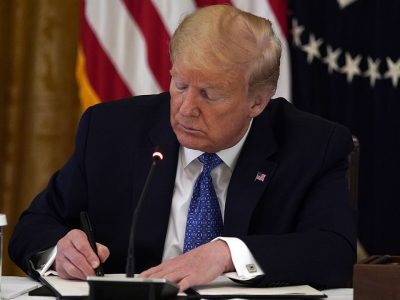How Harmful Was Trump’s COVID Response?
We know it was bad, but how much of the U.S. death rate can be attributed to him rather than circumstances?
The U.S. COVID response went badly in 2020. How much was because Trump was Trump? That is, if Trump had been a moderately competent but imperfect leader, facing a diverse population with a significant resistance to public health measures, how many lives would have been saved? That’s not a question that anyone can answer with any certainty. I’ve done some musing about it, though, and I think we might possibly be able to get at least a very rough sense of the difference.
I don’t think it makes sense to compare the U.S. to very different countries such as China, or to islands like New Zealand and Taiwan. From a public health point of view, it might be important to know how many lives could have been saved with a perfectly implemented government response. Even well-governed countries made mistakes, however, and compliance with public health measures was never going to be perfect in diverse, rambunctious society.
As a very rough way of thinking about this, I decided it would be useful to compare the U.S. with a similar country that also had an unsteady COVID response. I was looking for a developed country with lots of cross-border movement and independently minded citizens — people who wouldn’t necessarily comply with social distancing and might be averse to vaccines.
The first comparison I came up with was France. I also wasn’t sure what the death rate in France was, as opposed to some other countries, so there was less risk I’d pick a country because of a subconscious desire to slant the results. The economies are fairly comparable in qualitative terms, and the cultures aren’t that different when you look at the range of societies around the world. France is pretty well governed, and the government didn’t make the dumb mistake of starting out by embracing herd immunity like Sweden or Britain.
The two countries are also alike in having substantial subpopulations who resist compliance with public health measures. Trump may have encouraged that in the U.S., but there’s no reason to think he created the problem — especially given that France has a similar problem. Like the U.S., France experienced significant resistance to closures and social distancing and, more recently, significant vaccine skepticism. Of course, the countries are different in other dimensions, so this is far from a scientifically valid comparison.
Nevertheless, the comparison is instructive. I decided to use deaths rather than COVID cases as the comparator. Case counts are dependent on testing, and testing practices probably varied between the two countries. However, as my grandmother used to say, “dead is dead.” As of January 22, France had 72,000 deaths from COVID, and the U.S. had 433,725. On a per capita basis, France did better than the U.S., but not as much better as I would have expected.
More precisely, the U.S. has approximately five times the population of France (4.94 times, to be more precise). If the U.S. had had the same death rate as France in 2020, we would have had 355,700 deaths, not 433,725. That’s a difference of 78,000 deaths. If what happened in France is any indication, a President with average competence in place of Trump would still have seen a large number of deaths, but a lot of lives would have been saved.
The list of caveats is extensive. There are other differences between the countries, including demographics and the quality and availability of health care. The disease reached different countries at different times. There may also be at least small differences in how deaths are attributed to COVID. The comparison leaves out Trump’s possible contribution to the rapid development of vaccines, although that’s a point of debate.
The only roughly comparable country that did worse in terms of deaths per 100,000 than the U.S. is the U.K. Italy also did worse, although Italy has weaker governance than the other two countries, making it harder to blame the leadership. Trump comes out looking better, at least compared with Boris Johnson, than he does in comparison with Emmanuel Macron.
Both the U.K. and France are different from the U.S. in having more centralized government, making it easier to attribute policy outcomes to national leadership. In the U.S., it seems likely that the death count would have been much higher if we had had such a centralized system, thus preventing governors from taking more aggressive action than Trump favored.
In that sense, the better U.S. outcome compared with the UK may simply reflect the fact that Trump had limited power to control public health responses. In his disdain for science and embrace of crackpot remedies, Trump seems closer to Brazil’s Bolsonaro than to Johnson or Macron. To be fair, he wasn’t quite as bad as Bolsonaro, but then nobody else was either.
I don’t think there’s any real way to quantify how much better off the U.S. would have been if it had had an OK but not great leader who supported public health measures and didn’t try to undermine the government’s public health experts. Still, the comparison with France is suggestive.
I think it’s reasonable to assume that even if Trump had been a good though imperfect leader, we would still have had a very large number of deaths. The comparison with France suggests, however, that tens of thousands of lives might have been saved. Maybe someone will figure out how to do a rigorous study someday to pin down the numbers. That’s about as close as I can come to passing judgment, however.
Reader Comments
One Reply to “How Harmful Was Trump’s COVID Response?”
Comments are closed.







One key difference between the US and France is that the US influences many global policies and trends. Trump’s decisions made it difficult for Macron to fight the outbreak, but not vice versa.